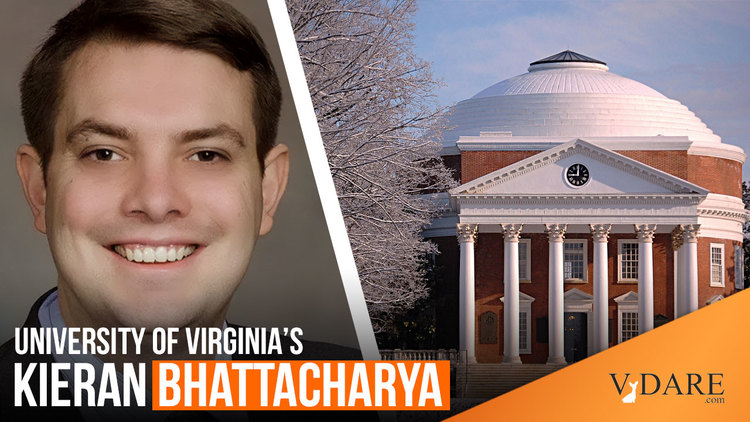
Every Good Boy Deserves Favor — Even If He Questions Microaggressions
By Steve Sailer
04/07/2021
Earlier: Colin Kaepernick vs. John Rocker: Some Speech Is More Free Than Other Speech
From Reason:
Kieran Bhattacharya’s First Amendment lawsuit can proceed, a court said.
ROBBY SOAVE | 4.7.2021 2:30 PMKieran Bhattacharya is a student at the University of Virginia (UVA) School of Medicine. On October 25, 2018, he attended a panel discussion on the subject of microaggressions. Dissatisfied with the definition of a microaggression offered by the presenter — Beverly Cowell Adams, an assistant dean — Bhattacharya raised his hand.
Within a few weeks, as a result of the fallout from Bhattacharya’s question about microagressions, the administration had branded him a threat to the university and banned him from campus. He is now suing UVA for violating his First Amendment rights, and a judge recently ruled that his suit should proceed.
Here was what the student said.
“Thank you for your presentation,” said Bhattacharya, according to an audio recording of the event. “I had a few questions, just to clarify your definition of microaggressions. Is it a requirement, to be a victim of microaggression, that you are a member of a marginalized group?”
Adams replied that it wasn’t a requirement.
Bhattacharya suggested that this was contradictory, since a slide in her presentation had defined microaggressions as negative interactions with members of marginalized groups. Adams and Bhattacharya then clashed for a few minutes about how to define the term. It was a polite disagreement. Adams generally maintained that microaggression theory was a broad and important topic and that the slights caused real harm. Bhattacharya expressed a scientific skepticism that a microaggression could be distinguished from an unintentionally rude statement. His doubts were wellfounded given that microaggression theory is not a particularly rigorous concept.
But Nora Kern, an assistant professor who helped to organize the event, thought Bhattacharya’s questions were a bit too pointed. Immediately following the panel, she filed a “professionalism concern card” — a kind of record of a student’s violations of university policy.
“This student asked a series of questions that were quite antagonistic toward the panel,” wrote Kern. “He pressed on and stated one faculty member was being contradictory. His level of frustration/anger seemed to escalate until another faculty member defused the situation by calling on another student for questions. I am shocked that a med student would show so little respect toward faculty members. It worries me how he will do on wards.”
According to Bhattacharya’s lawsuit, the concern card generated interest from an assistant dean in the medical school, who emailed him and offered to meet. The assistant dean assured him that “I simply want to help you understand and be able to cope with unintended consequences of conversations.”
Bhattacharya responded that contrary to anyone’s assertions, he had not lost his temper or become frustrated with the panel:
Your observed discomfort of me from wherever you sat was not at all how I felt. I was quite happy that the panel gave me so much time to engage with them about the semantics regarding the comparison of microaggressions and barbs. I have no problems with anyone on the panel; I simply wanted to give them some basic challenges regarding the topic. And I understand that there is a wide range of acceptable interpretations on this. I would be happy to meet with you at your convenience to discuss this further.
Then a dean of student affairs asked to meet as well.
Meanwhile, the Academic Standards and Achievement Committee met to to discuss the concern card. This committee voted to send Bhattacharya a written reminder to “show mutual respect” to faculty members and “express yourself appropriately.” The committee also suggested that he get counseling.
On November 26, this suggestion became a mandate: The student was informed that he must be evaluated by psychological services before returning to classes. Bhattacharya repeatedly asked university officials to clarify what exactly he was accused of, under whose authority his counseling had been mandated, and why his enrollment status was suddenly in doubt, according to the lawsuit. These queries only appear to have made UVA officials more determined to punish him: Bhattacharya’s mounting frustration with these baseless accusations of unspecified wrongdoings was essentially treated as evidence that he was guilty. At his hearing, he was accused of being “extremely defensive” and ordered to change his “aggressive, threatening behavior.”
He was ultimately suspended for “aggressive and inappropriate interactions in multiple situations.” On December 30, UVA police ordered him to leave campus.
Back in the 1970s, the Soviets used mental health hospitals to punish and silence dissidents, as in Tom Stoppard’s play Every Good Boy Deserves Favor. Psychiatric treatment as punishment for political incorrectness is more rare in the U.S., but it was imposed on baseball pitcher John Rocker in 2000 for his funny observations on New York City.
